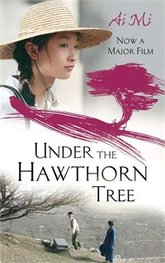 I recently finished reading the novel Under the Hawthorn Tree by Ai Mi. The novel is set in China’s Hubei province in the early 1970s. The main character Jingqui is an intelligent, beautiful, if not a little naive, young woman who has already made great sacrifices and strides in her life. Set during China’s Cultural Revolution Jingqui’s father is being kept away from the family because of his land owner status and her mother, who once was respected has been labeled a “capitalist” and struggles to provide for Jingqui and her two siblings. The story begins with Jingqui being sent by her school to a small village to record the histories of the rural peasants along the Yangtze River. While there she is consider wealthier and to have more than the “peasants” in the rural areas, although what we learn is the peasants do not go hungry as often as those who live in the urban cities. Jingqui struggles to live her class position and as she spends time in the village recording stories begins to experience feelings for a member of the Geological Unit named Jianxin, nicknamed “Old Third.” As Jingqui and Old Third’s relationship grows we follow Jingqui back to her city as she works at temporary jobs and looks to her future and wonders what it will hold given her social background and her inevitable departure from the city to work in a rural region as part of policy referred to as the Down to the Countryside Movement. Opportunities, joy, sadness and ultimately Jingqui’s coming of age story drive the themes of this book. I enjoyed reading the book and found myself learning about China’s struggles through the Cultural Revolution by reading and understanding Jingqui’s thoughts. The struggles portrayed in the novel are real and heartfelt. Jingqui’s ever-steady desire to do what is best for her family if touching and the love expressed by Old Third is beautifully portrayed with a few poetic entries, which are simplistically beautiful and honest. The story, although not ground breaking or exceptionally provocative, is a story of a young woman seeking life and making choices even when their appears to be no choice. Jingqui’s story subtlety challenges the time in which she was living and challenges her to seek what she desires. It is a story, which will return to my thoughts even after I have forgotten the character’s names. Within the context of my position in China this book brought a few things to light. I first chose the book because it took place in China and discussed elements of the education reform during the Cultural Revolution. Having a background in history I thought the story would be interesting. What I discovered when reading was a history I knew very little about. I had heard the term Cultural Revolution and understood elements of what the time meant for those living in China, however did not fully understand the state in which they lived. I recognize that Under the Hawthorn Tree is one person’s interpretation of events and not a general agreed upon consensus, however I have come to appreciate more of the struggles the Chinese people have experienced in the past 47 years. The strong desire for children to have opportunity and the pressure they are under to perform is more understandable now as I see that only several decades ago was not possible. Lesson Notes: I was reminded of my strongly held beliefs through reading Under the Hawthorn Tree; it is very important to understand perspective and experience in order to gain a better understanding of the larger picture. Knowing the history helps to understand the present and where the future could lead.
1 Comment
Shelley Harris
3/11/2013 12:32:55 pm
I am encouraged by the curious nature in which you delve into and discern the plight(s) of others and your framing around understanding the imperative and relative terms we frequently use to understand the breadth and depth of what "culture" relates to. Decisions are inevitable, choices are choice. Thank you for your reflection. SH
Reply
Leave a Reply. |
Ms. Kolshuk's BlogWelcome to my blog where I post about my teaching practice, ideas, findings and discuss topics of an educational nature. Please feel free to comment and/or email with any topic suggestions.
Categories
All
Archives
July 2017
|
 RSS Feed
RSS Feed